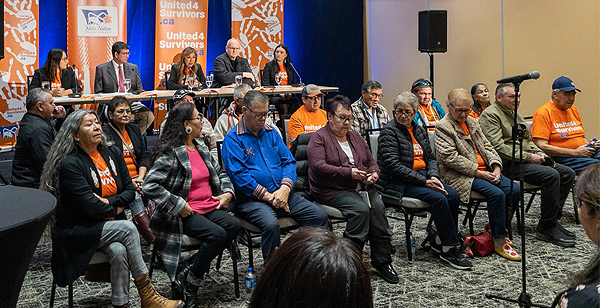Île-à-la-Crosse Survivors are tired of waiting and are taking action
- By NC Raine | February 10, 2023
Survivors of the Île-à-la-Crosse Residential School that housed Métis children in Saskatchewan have filed a class action lawsuit against the governments of Saskatchewan and Canada.
The group of survivors seek recognition, justice, and reparation for the years of harm the students suffered while attending the school. The lawsuit was filed by six survivors and generational survivors in late December, after what the Île-à-la-Crosse survivors’ committee reported were many unsuccessful attempts to negotiate with both the provincial and federal governments.
“The Métis Nation-Saskatchewan, on behalf of the Métis community in Saskatchewan, supports the new class action lawsuit and joins the plaintiffs in urging both governments to negotiate,” said Métis Nation-Saskatchewan (MN-S) Vice President Michelle LeClair at the lawsuit announcement at Dakota Dunes Resort Hotel on January 24.
“If we can’t reach an early resolution to this, the plaintiffs will pursue this litigation rigorously, and we as the Métis Nation-Saskatchewan support this wholeheartedly,” said LeClair.
The Île-à-la-Crosse Residential School was open from the 1820s to the 1970s when the school burnt down. The generations of survivors have reported cruel living conditions at the school, and suffered physical, sexual, and mental abuse by the staff. Well documented is also the loss of language, culture, and identity of the survivors as a result of the abuse at the school. Approximately 1,500 children total attended the Île-à-la-Crosse Residential School.
“We suffered the same trauma as (those at) all the residential schools. The agenda was to take the culture out of the child,” said Louis Gardiner, the lead and named plaintiff in the class action lawsuit.
“We lost everything. Language, culture, and identity. All we ask for is to be treated fairly as survivors,” he said.
Gardiner, who was five years old when he began attending the school, said he was separated from his family, given a number rather than using his name, was forbidden from speaking Michif, and was regularly physically abused.
“We need to tackle this together, as one Métis family,” said Gardiner.
The committee said that survivors were not included in the Indian Residential School Settlement Agreement because the school didn’t qualify as a residential school. A memorandum of understanding (MOU) was signed with Ottawa in 2019, but the committee said no meaningful progress has been made. No statements of defence have yet been filed.
“We all have a moral, ethical responsibility to settle the claims of the Métis residential school system,” said Duane Favel, mayor of Île-à-la-Crosse.
“It’s heartbreaking that we’re still struggling to get recognized as Métis residential school survivors who suffered the same abuses and trauma,” he said. “We need to bring closure to Île-à-la-Crosse.”
The lawsuit is brought on behalf of all First Nation, non-status, Inuit, and Métis people who attended the school at any time, as either day students or residential school students. The lawsuit also includes claims on behalf of close family members of survivor class members.
LeClair said the effects of the school is still clear in the province today.
“You see the harm in our communities. You see the suicides. You see the abuse of drugs and alcohol. You see beautiful communities but you see the loss of language and culture. The grieving for the land. That was a result of this residential school. And that hasn’t been acknowledged,” said LeClair.

